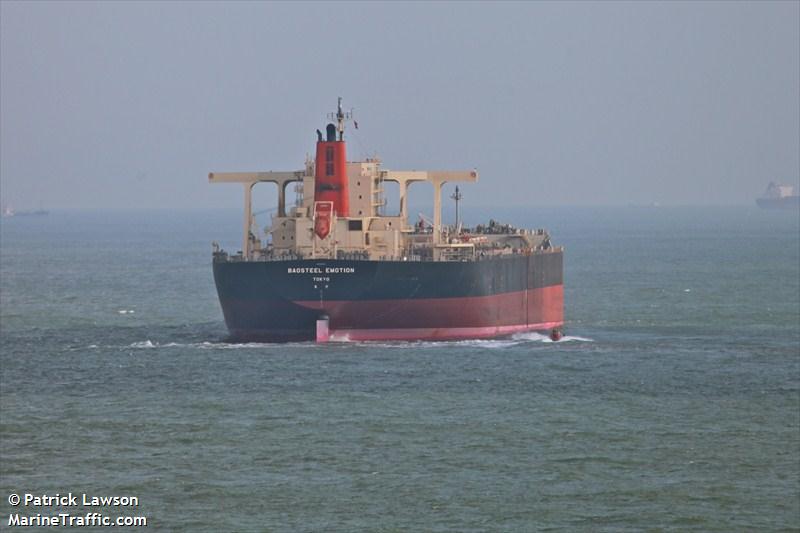Global Crude in Transit Reaches Record 1.24 Billion Barrels as Supply Surges
A flotilla of crude oil on the world’s oceans expanded to a fresh high as producer nations keep adding barrels and the tankers sail further for deliveries.

By Bloomberg News
April 21 (Bloomberg) — A Shanghai court ordered the seizure of a Japanese ship owned by Mitsui OSK Lines Ltd. as compensation for the loss of two ships leased from a Chinese company before the two countries went to war in 1937.
The 226,434-ton Baosteel Emotion was impounded on April 19 at Majishan port in Zhejiang province as part of a legal dispute that began in 1964, the Shanghai Maritime Court and Mitsui OSK said in notices on their websites.
The holding of the ship reflects strained ties between China and Japan amid a territorial dispute over an island chain and visits by Japanese politicians to a Tokyo shrine honoring that country’s war dead. The move is the first time a Chinese court has ordered the seizure of Japanese assets connected to World War II, and could cast a pall over the countries’ trade, according to Shogo Suzuki, a senior lecturer at the University of Manchester in the U.K. who studies China-Japan relations.
“Many of the major Japanese companies like Mitsubishi or Mitsui have existed through back to the pre-war era and could all be implicated in one way or another,” Suzuki said. “Japanese companies can’t extract themselves easily at this stage so I think they’ll be quite worried.”
Disputes have increasingly shifted to the courts, with a Chinese judge accepting a lawsuit last month against two Japanese companies, including Mitsubishi Materials Corp. accused of using forced labor during the war.
Discourage Business
Speaking at a briefing today, Japan’s Chief Cabinet Secretary Yoshihide Suga said the seizure could discourage Japanese companies doing business in China. Mitsui OSK spokesman Atsushi Seki said the company is studying details of the case and trying to come up with a solution.
The dispute had its genesis in 1936, when Mitsui OSK predecessor Daido Kaiun chartered two vessels from Chung Wei Steamship Co., only to have them appropriated by the Japanese government, Mitsui OSK said in a statement today. Both ships were later lost at sea.
The heir of Chung Wei Steamship’s president sued unsuccessfully in Japan in 1964 and 1970, and then took the case to China in the late 1980s. After the maritime court ruled in the plantiff’s favor, Mitsui was seeking an out-of-court settlement when the vessel was “suddenly impounded,” Mitsui OSK said.
Japan argues that China gave up its right to reparations as part of a 1972 joint communique signed when the two countries established diplomatic relations. The communique says China “declares that in the interest of the friendship between the Chinese and the Japanese peoples, it renounces its demand for war reparation from Japan.”
Trade Relationship
China and Japan currently have a $366 billion trade relationship. Foreign Ministry spokesman Qin Gang called the case a common commercial dispute.
“This case has nothing to do with the war reparation between China and Japan,” Qin said at a briefing today. “The Chinese government sticks to upholding all the principles of the China-Japan joint statement and this position remains unchanged.”
The Baosteel Emotion, built in 2011, is a 320-meter long ore carrier and is now docked at Majishan, according to data compiled by Bloomberg. The company’s shares fell as much as 2.2 percent today in Tokyo trading, while the broader Topix index declined 0.2 percent.
The legal dispute over the ship comes as Japan and China spar over islands both countries claim in the East China Sea, and over Japan’s wartime aggression. Prime Minister Shinzo Abe sent an offering to the Yasukuni Shrine in Tokyo, following the visits this month of two cabinet ministers to the site that honors Japan’s war dead, including World War II criminals.
The Shanghai Maritime Court ruled in December 2007 that the Mitsui Group should pay 2.9 billion yen ($28.3 million) in compensation, according to the court statement. The case was first filed with the court in 1988.
–With assistance from Kiyotaka Matsuda in Tokyo.
Copyright 2014 Bloomberg.

Sign up for gCaptain’s newsletter and never miss an update

Subscribe to gCaptain Daily and stay informed with the latest global maritime and offshore news
Essential news coupled with the finest maritime content sourced from across the globe.
Sign Up